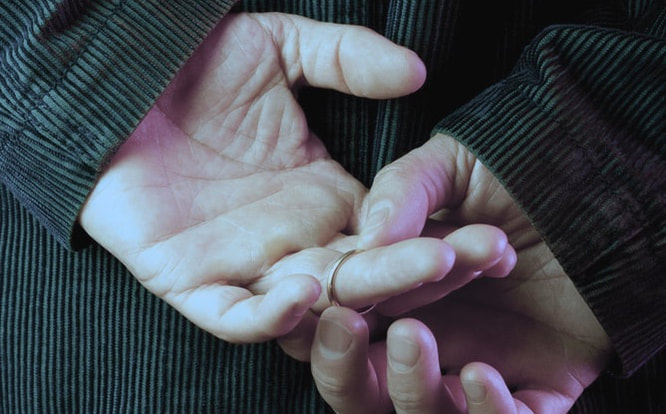|
There is a hunger within every human heart to connect deeply with others and ourselves. Not every person has the same appetite for human connection. While some may have a more voracious appetite to connect, others may not have as strong a felt need for it. Loneliness is good. Yes, you read that correctly. Like a hunger pain, we learn to listen to and honor our loneliness. Our hunger for connection is not something we will ever be able to shake. We would not want to "cure" our loneliness. That would equate to a broken form of emotional leprosy, not being able to "feel" our need for the nourishment of relationships. The pain of loneliness is different from the pain of isolation. Loneliness alerts us that we have a need to connect. Isolation is the experience of feeling hopelessly cut off from meaningful connection. Children who have grown up with severe food insecurities tend to have trouble "feeling hungry" and "feeling full." Their bodies and brains do not register the hunger feeling in the way their precious bodies were intended. Hunger is a feeling that tells me that I need to eat. Loneliness is a feeling that tells me that I have a hunger to connect. Isolation is a feeling that tells me that I have am starving relationally and am cut off from the relational nourishment of time spent with God, self and others. There are days when I feel lonely for my wife. Other days I might experience a loneliness for my friends. And still there is a loneliness for God that I feel and sometimes substitute with a person. One of the ways some people manage loneliness is to look at porn. In my friend Michael Cusick's book, "Surfing for God", he points to what people are looking for when they turn to fake connection for real connection. Michael's book hinges on the idea that, "when a man walks into a brothel, he is actually looking for God." Just like children in Haiti who eat "dirt cakes" to make their bellies stop aching, porn offers the same kind of sensation. Porn is a "dirt cake" that will never satisfy the intimacy we are seeking. In many ways it leaves us feeling even more gross, isolated and dissatisfied. Many of the "modern brothels" we spend time in aren't always sexual. Sometimes social media is a brothel we stare into. It offers the illusion of connection without any of the actual lasting benefit of being vulnerable. In the boredom of our loneliness, we log into Instagram attempting to borrow on the adventures of other people. We stare into the lives of people we know and we can't help but feel even more painfully alone in our own story. This past weekend at a college football game I was surrounded by people (and guilt myself) of taking lots of pictures. Never before have people been able to record so many precious memories of their life together. What struck me was the obsessive and pervasive behavior all around me...and it felt like many were actually missing the moment in their attempt to capture the moment. In our loneliness we seek to capture an image of connection and we miss the actual connections that could actually be happening. And then we wonder why we feel so isolated and cut off. Jesus felt lonely. He is often recorded to have wandered (on purpose) out to the lonely places to pray and be alone with the Father. Luke’s Gospel reveals eleven unique accounts of Jesus feeling his loneliness along with his response, which was to intentionally seek out the connection he needed most. Solitude and isolation "look" similar but they could not be more different. Solitude and isolation are not the same thing. Moving out into the lonely places to be with God allows me to meet the deepest longing of my soul. To enter into silence is to allow those lonely feelings to become even more noisy. To remain in the silence allows the noise to settle and for God's presence to be sensed and known. Sometimes we enter into silence with the intent of listening. Maybe we open our Bible. Maybe we close it. Maybe we open our journal and we write. Other times we close it and put our pen away. Some days we open our eyes and stare at beautiful landscapes noticing what's happening in our outer geography. Yet, other days may be marked by laying face down on a blanket paying attention to what's happening in our inner geography. The cure for loneliness is not actually a cure. It is a healthy response to hunger. Just like I might desire candy, it is wise to listen to the desire and discern what I am needing. Questions for further consideration: 1. Where do you tend to go first when you feel lonely? 2. When are you most prone to isolating yourself? 3. Is there a way that you are attempting to satisfy loneliness that only leaves you even more painfully lonely? 4. What would it look like for you to listen to your loneliness and honor it well? Thats What The Lonely Is For
by David Wilcox The depth of your dreams The height of your wishes The length of your vision to see The hope of your heart Is much bigger than this For it's made out of what might be Picture your hope, your heart's desire As a castle that you must keep In all of its splendor, it's drafty with lonely This heart is too hard to heat But when I get lonely, that's only a sign Some room is empty that room is there by design If I feel hollow, well, that's just my proof that there's some more For me to follow that's what the lonely is for Is it a curse or a blessing? This palace of promise When the empty chill makes you weep With only the thin fire of romance to warm you These halls are too tall and deep But when I get lonely, that's only a sign Some room is empty that room is there by design If I feel hollow, well, that's just my proof that there's some more For me to follow that's what the lonely is for But you can seal up the pain Build walls in the hallways Close off a small room to live in But those walls will remain And keep you there always And you'll never know why you were given Why you were given the lonely Some room is empty, if you feel hollow that's Just your proof that there's some more You need to follow that's what the lonely is for For the depth of your dreams The height of your wishes The length of your vision to see The hope of your heart Is much bigger than this For it's made out of what might be But when I get lonely, that's only a sign Some room is empty that room is there by design If I feel hollow, well, that's just my proof that there's some more For me to follow that's what the lonely is for When I get lonely, some room is empty And if I feel hollow that's just my proof that there's some more For me to follow that's what the lonely is for Me to follow that's what the lonely is for, for me to follow
0 Comments
We live in a day and age when our lives are less hidden. The advent of social media has accelerated human connection and not all of it is helpful. Our mobile phones have become a primary method for communication. They have also become a powerful tool for manufacturing and maintaining toxic secrets.
You will not find one body of valid research promoting the introduction of toxic secrecy in a marriage to help a relationship flourish. No couple in my counseling office has ever uttered the words, “Our marriage was really struggling, but things got so much better once we started keeping secrets from one another.” If you are in a marriage where secrets are sabotaging trust, let’s take a deep breath and take a minute explore this a little further. If you are keeping a secret from your spouse, your feelings of guilt, shame and fear are understandable. They will force you to hide, even from yourself. Over time, this guarded posture will suffocate you the longer you remain in it. The weightiness of your secret/s will cause an emotional, relational and a spiritual scoliosis, bending and shaping you into someone who you will not even recognize. It’s time to begin exploring how to pivot toward the freedom of transparency. On the other hand, if you suspect that your spouse may be hiding something, the upset and heartache you are experiencing are also valid and normal. No matter how you happen to uncover a secret, whether accidentally or if you go in hunting for it, your hurt is a very normal human response along with anger, fear, and sadness. The longer you remain in this cycle of mistrust, the more profoundly you will be formed and shaped by it. To remain in an enduring pattern of hyper-vigilance to your spouses habit of lies and secrets is absolutely toxic. It’s time to begin exploring how to courageously pivot toward the freedom of some newly formed boundaries. In marriage, there are huge differences between healthy secrets and toxic secrets. Healthy secrets are time limited for things like birthday gifts, special surprises like concert tickets, and other life giving celebratory events. Healthy secrets promote a spirit oneness in the marriage leaving couples feeling more intimately connected. For example, we willfully operate within agreed upon budgets. We also don’t humiliate or embarrass but celebrate and affirm. Healthy secrets bless your spouse should they ever happen to discover them prematurely. What’s the difference between my “private thought life” and a “secret.” Everyone has private thoughts. Your thought life is a much different environment than your secret life. Private thoughts are reserved as a place for the necessary work of internal consideration, contemplation, discernment or self examination. Your private thoughts can hold onto healthy secrets indefinitely without any negative outcome. Secrets, specifically “toxic secrets”, indicate some current or future action that will jeopardize the integrity of a trusting relationship. Toxic secrets are marked by the strategic intent to withhold, mask, manipulate or hide both actions or intentions. Private thoughts honor the timeless tradition of seeking wisdom and listening well to wise counsel. Another way of describing a toxic secret is “any action or intent that threatens oneness in a marriage.” Oneness is the tender but resilient space between a husband and wife that is reserved for honoring one another well and living a Christ centered life together. Oneness is a space marked by a growing number of the fruits of the spirit; “love, joy, peace, forbearance, kindness, goodness, faithfulness, gentleness and self-control. Against such things there is no law.” (Galatians 5:22-23) If a husband cultivates intimate emotional space with a woman who is not his wife or his therapist, and he elects to keep the details of his intimate engagement sheltered or harbored in secrecy, that would describe an example of a “toxic secret.” Couples who keep secrets plant seeds of discontent and over time they grow into trees that can not be pulled up by hand. Had those secrets been given the opportunity to be shared and known when they were saplings, they could have been dealt with and handled accordingly being pulled out by the root. By the time many couples come into marriage counseling, they have sown many seeds of toxic secrecy that have been planted. Time has often only intensified their resolve to keep them hidden. One excuse is, “I just don’t think it’s worth hurting my spouse with that information after so many years.” Another might be, “I love them to much to share this secret now. It would wreck them.” Secrets grow and they become heavy and burdensome. They crowd out trust and intimacy. Intimate touch, soft tones, tender nudges, loving approaches, loving pursuit all become the first victims of toxic secrecy. To pursue closeness with my wife is to risk being known which is to risk being found out. Secrets love to grow in darkness. The light of day exposes them for what they are…weeds. Have you ever seen a home so overgrown with weeds and vines that the structure had become dramatically compromised? There is an abandoned condemned building in Chattanooga near the intersection of Main and Market that had a large tree growing into and out of the brick. No zoning committee would ever approve of that structure being opened for business while still hosting this enormous tree in its infrastructure. The same is true with toxic secrets. They will blow up your life eventually. Ivy growing on red bricks can be very pretty. The reality, though, is that ivy can literally tear down a brick wall given enough time. It weaves its way through the mortar and over time slowly allows the wall to crumble under the sheer weight of itself. Toxic Secrecy shows up in relationships for a number of reasons. Here are four; 1. To guard my own self interest. 2. To protect my self image. 3. To mitigate my deep fear of rejection. 4. To maintain my unhealthy attachment or addiction. As damaging as a secret may be to a relationship, secrecy is only a symptom. It’s actually not the core issue. Exposing the secret will requires more than a singular tearful confession. It is a compound fracture that will involve a skilled and experienced facilitator. It will also require us to lean on the truth of what Chip Dodd describes as the “algorithm for change” which he defines as “willingness + patience + work + time.” When couples come in marriage counseling to confront toxicity in their relationship, lies are exposed and the truth comes out. Old wounds are exposed to oxygen and relationship foundations have the opportunity to be repaired and renovated. Sometimes the truth can shatter whatever foundation remains, like new wine poured into an old wine skin, a marriage may not be able to endure the discovery of toxic secrets. In the recovery community this is called “hitting rock bottom”. Years of witnessing humans recover informs us that this actually can become the birthplace of human change and transformation. To leave toxic things in the ground is to ensure that the drinking water is poisoned. They may be hidden for now but they always leak into the water supply for generations upon generations of poisoning. Scripture calls this generational sin. Conversely, when toxic things are exposed and extracted and given the opportunity to be touched by God’s grace, generations can be blessed by the refreshment of this clean living water. To confront or admit a secret, much less decades of them, is courageous. It demands bravery and a willingness to hold that which I’ve been holding tightly much more loosely. Releasing a toxic secret should not be done recklessly or carelessly. But it must be done with the right infrastructure of support. There is no way to spare hurt but done well, you may be able to spare even more unnecessary injury. Before unleashing a secret you have been hiding, I would recommend a confidential meeting with a professional counselor in your community. How do I protect our marriage from toxic secrecy?
|
ELBOW TREEArchives
July 2023
Categories
All
|



 RSS Feed
RSS Feed














